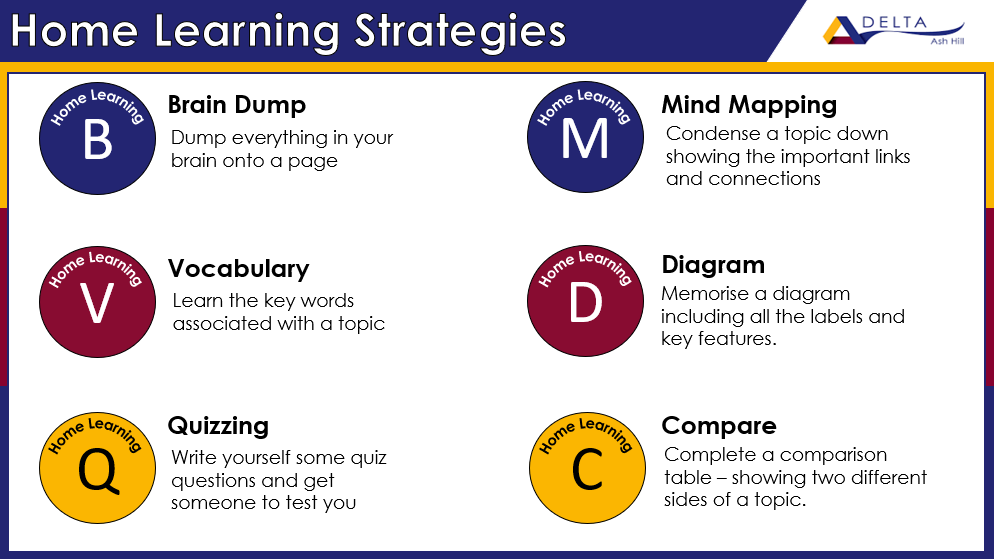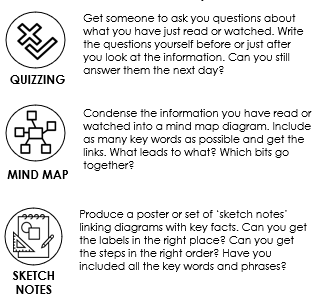
Overview
At Ash Hill Academy, we know that completing home learning is essential to long-term academic success. It allows our students to extend their learning and to reinforce what has been learnt in class.
Hesiod (Greek Poet)If you add a little to a little and do this often, soon the little will become great.
Our home learning policy for Years 7-11 is as follows:
Every day, your child will be expected to study for around one hour. Home learning will be in three 20 minute parts:
- Knowledge Organisers and quizzing.
- Sparx Maths and Science
- Reading for pleasure.
In addition to the above students may receive further home learning tasks on platforms such as GCSE Pod and Language Nut. These should be completed in addition to the above.
It is likely KS4 students will also be set additional homework to aid their classwork, such as completing coursework, past exam papers etc.
Reading
“The more that you read. The more things you will know.
Dr SeussThe more that you learn. The more places you’ll go.”
At Ash Hill Academy, we know that reading is the single most powerful skill that our students will ever acquire.
For 20 minutes each day we would like students to read for pleasure. To read books that they enjoy and to read books that challenge them to think, to imagine and to explore the word around them.
Reading is the tool that will unlock learning and progress in every single other subject area.
We have a superb Learning Resource Centre, a facility that provides our students with a varied and exciting selection of reading material from which to borrow. Students can build their reading independence by selecting books that intrigue and interest them.
How can reading ability be improved?
- Be encouraged to ask questions about the text. Why? How? What might happen next?
- Develop frequent reading habits. We advise our students to read regularly!
- Read with another person and then discuss key features of the text.
- Read a variety of interesting texts from an array of writers with a range of purposes. For example: fiction, non-fiction, magazines and newspapers.
- Visit a library or bookshop to inspire varied reading.
- Discuss your current or recent reads with teaching staff and peers to develop a culture where reading is at the forefront of your learning experience.
- Read books that you enjoy and that challenge you!
- Try reading a new genre or a book by a new author.
J .K. Rowling“I do believe that something very magical can happen when you read a good book.”
Sparx Maths and Science
Sparx is an online maths resource that is used for homework. This site includes video lessons and quizzes that are self-marking and give instant feedback. It need not only be used for homework but also to consolidate all maths learning, whether it be from work that you are currently studying in class or revision of previous topics. Your Knowledge Organiser or Question Level Analysis (QLA) document given to you after any maths assessment will guide you to which clips are the most relevant at any time. Don’t forget that you can always do extra to the ones your teacher sets you. There’s no limit to the amount of learning you can do! As you earn XP points in Sparx, your teachers will award you with stickers. These are something to be really proud of; see how many you can collect in the year
Retrieval

What is it?
Learning is the acquisition of knowledge or skills through study, experience or being taught.
Retrieval is all about being able to recall specific information as an when required. Having the power of knowledge ready when you need it gives you the confidence and ability to unlock higher order skills such as analysis, evaluation, synthesis and problem solve solving.
How to get better at it?
Improved knowledge retention comes from practise. Repeated retrieval of information itself makes this information more retrievable to you.
Its all about making your brain process and recall any information you’ve looked at, it is not about copying!
Aim to read and process any information you’re given. Then after a short break, cover it up and then complete a task in your practise book to recall that information. Then check to see if you missed anything and add this in after. Each time aiming to be able to recall more.
Your knowledge organiser is a collection of all the key knowledge essential to making progress in each of your subjects. Your job is to learn this information in your organiser. The more you know the better you will be at using it, applying it, analysing it and solving problems with it in your lessons.
Knowledge Organiser
YEARS 7-11
Every student will be issued with a Knowledge Organiser and Retrieval Book each term. You should use them to complete 20 minutes a day of retrieval practice.
Students will also be quizzed on key aspects of their knowledge organiser in lessons and around the academy.
Teachers may specify certain parts to learn at particular times and may set additional home learning tasks to go along side this.









Online

GCSEPod podcasts are designed for mobile devices, so it’s like carrying a huge pile of textbooks and revision guides around with you everywhere.
Its like an online Knowledge Organiser!
Have an expert read and explain everything for you clearly and precisely with all the right facts, quotes, keywords, dates and annotated diagrams on screen. You won’t need to use it for long before you feel the impact. Consistent use in short chunks is proven to support achievement.
Your teacher may create an assignment which will include a playlist of podcasts for you to watch and some questions for you to answer, or you can choose your own pods focussing on areas you know you need to improve.
After watching a Pod you must complete a retrieval activity in your book to help you memorise that information.

Languagenut gives you access to all the vocabulary you have been learning in your Languages lessons. You can access it from any device, making it perfect for using it both on the go and when settling down for a longer home learning session!
The website and app are jam-packed with loads of different retrieval activities to keep your language skills tip-top. Play games on your own or challenge your friends and see who will be victorious!
Practise all four of your key skills – listening, reading, speaking and writing – in the zone dedicated to exam-style questions, perfect for GCSE preparation.
Your teachers can set you assignments to complete and you can deepen your understanding by independently exploring the wealth of knowledge available to you.
After completing any assignment you must complete a retrieval activity in your book to help you memorise that information.
Retrieval Activities
3 Golden Rules
- Never copy. All ways cover up first.
- Leave some time to forget.
- Get feedback on how well you did.
